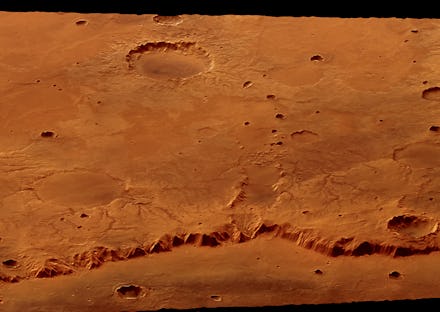Scientists Just Discovered Another Sign Suggesting Life Existed on Mars

Carbonates discovered in Martian rock suggest the planet used to have an Earth-like ocean that could have supported life, according to new research published in the Journal of Geophysical Research.
This is the latest study in a growing body of research that suggests ancient Mars was warm, wet and possibly hosted life.
The carbonates were found in 3.8 billion-year-old rock in the Huygens basin that spans about 290 miles:
Why carbonates matter: Carbonates are minerals found throughout Earth's oceans. They're an important part of the carbon cycle, and some marine organisms use them to build shells.
Now the Mars Reconnaissance Orbiter has captured detailed images of the Martian surface, and it looks like regions of Mars — including Huygens basin and Lucaya crater — are covered in carbonates. We might be looking at the remains of an ancient Martian ocean floor.
"This gives us a stronger picture of a wet environment that was not extreme," astrobiologist Janice Bishop told Gizmodo. "If carbonates were pervasive 4 billion years ago, it's possible that the environment was very microbe-friendly at that time."
The researchers say we need more detailed analysis of the chemistry on Mars to figure out whether or not it supported life. NASA's Mars 2020 rover could collects samples from the area and return them to Earth for scientists to study up close. Better yet, astronauts might be exploring the surface soon.